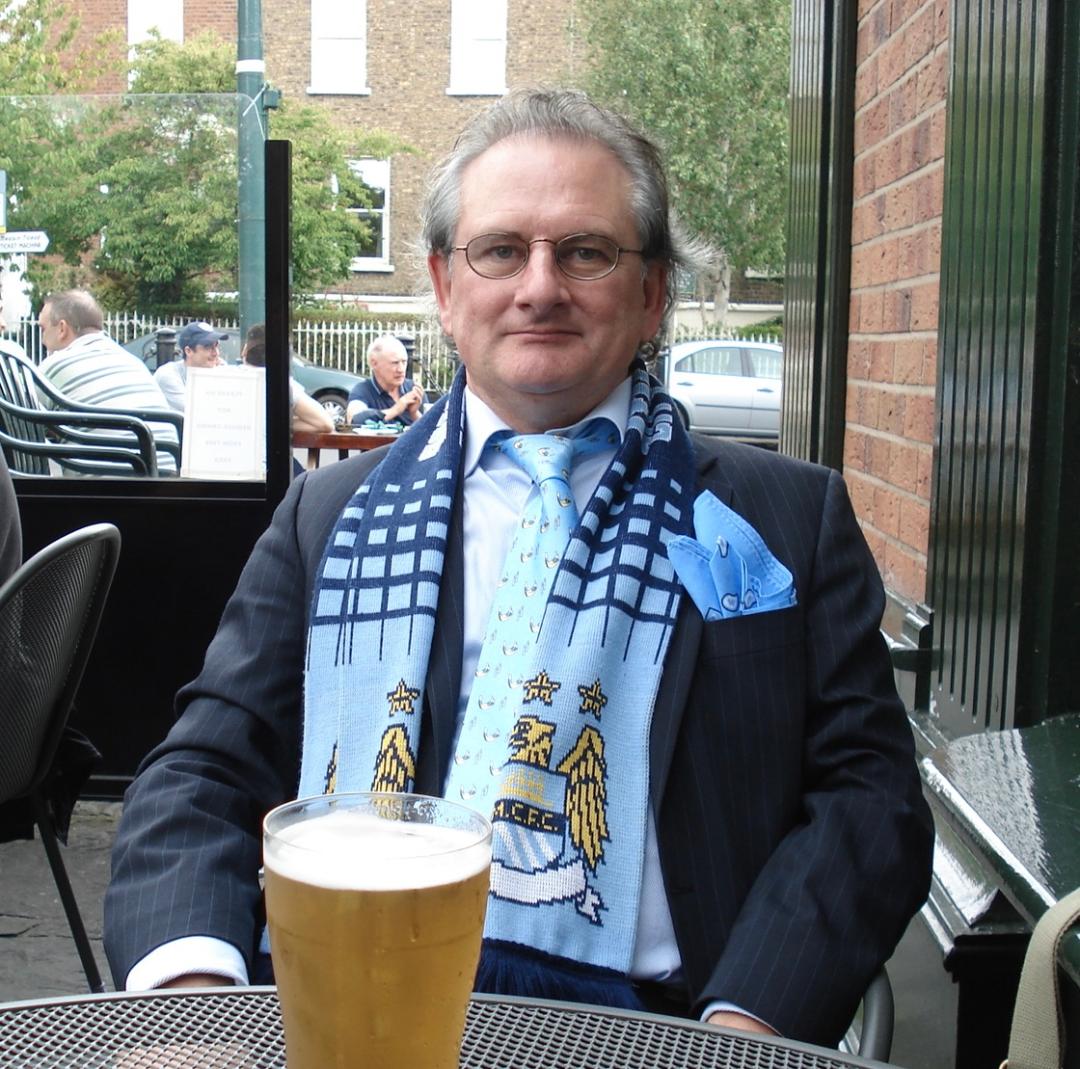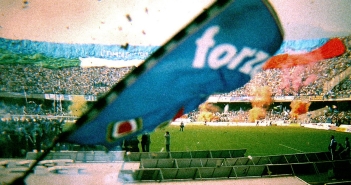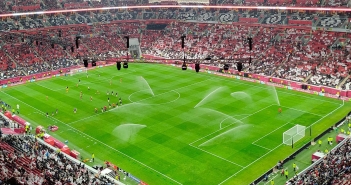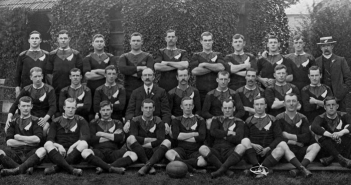In the first part of his essay concerning his enduring lifelong fandom of Manchester City FC, and the club’s current owners’ wealth vis-á-vis his left-wing politics, Desmond Traynor recounts his origin story as a supporter of the club, and offers a critique of the Irish soccer commentariat’s biased attitude to City’s success.
After many years in which the world has afforded me many experiences, what I know most surely in the long run about morality and obligations, I owe to football.
Albert Camus, article in Racing Universitaire Algerios club’s alumni magazine (1957)
Looking back, I can see that my attraction in starting to support Manchester City F.C. in 1968, at the age of seven, was perhaps the first indication of a budding contrarianism. Not that I had enough self-consciousness at the time to recognise it as such. What is interesting about certain decisions one makes as a child, adolescent, and even as a young adult, is that they are usually made prior to one having the full story, about oneself or others, or in general about this thing we call Life – if, indeed we ever get the full story. They tend to be instinctual, or even pre-cognitive, and so revealing of particular bedrock character traits in a still-forming personality. However, lest we kick off on the wrong foot, please note that I have not bestowed this questionable epithet on myself; rather, it has been attached to me by others. I do not necessarily think of myself as a contrarian, or even contrary. I just like different things than other people do, or have different reasons for liking the same things that other people also like. Which, obviously, could be said of anyone else’s idiosyncratic likes and dislikes. It’s called Taste, and there is no accounting for it – good or bad.
The origin story runs like this: 1968 was the year Manchester United won the European Cup, and almost everyone in Ireland who was not already a fan of that club became one. They captured the floating voters. I thought to myself: ‘Screw this for a game of soldiers, I’ll be a Manchester City fan’. This was not merely, or only, evidence of a latent, wilful desire to be atypical or antagonistic, or the product of a childish caprice: we had a good side then, and won the League that same year, the F.A. Cup the following season, and the European Cup Winners’ Cup and the League Cup in the 1969/70 campaign. The team was full of gifted players, heroes whose magical names rolled off the tongue, which still resonate today (among City fans, at any rate): Francis Lee, Mike Summerbee, Neil Young (no, not that one!), Tony Book, Joe Corrigan. Best of all was Colin Bell, one of the greatest midfield playmakers England has ever produced. Shrewd, languid, possessed of incredible stamina (his nickname was Nijinsky – after the racehorse, although ballet dancers require considerable stamina too), he could run box to box, but he didn’t always need to, as he could pick out a defence-shredding pass from forty yards. He was the definition of ‘silky skills’. Such was my infatuation that, as a fledgling player, I modelled myself on his example. I even persuaded my mother to sew a number 8 onto the back of my boyhood City jersey, in his honour. (Speaking of jerseys, another reason for my plumping for City was that I preferred the sky blue they wore to the red sported by the Red Devils.) Bell’s career was cut short in November 1975 when, at the age of 29, his right knee was severely injured in a challenge by Manchester United’s captain Martin Buchan, during a League Cup derby at Maine Road.
But then, apart from winning the League Cup in 1976 with a victory over Newcastle United at Wembley, we had a bad forty years or so at the office, with mid-table mediocrity gradually giving way to spells in the old Second Division (1983–1985, 1987–1989, 1996–1998, 1999–2000 and 2001–2002), yo-yoing between the top flight and what is now the Championship. We even endured the ignominy of being relegated to Division 3 for a year in 1998–1999 – as chronicled by Mark Hodkinson in a weekly column for The Times, later collected together in his book Blue Moon: Down Among The Dead Men With Manchester City (2011). Thus did the phrase ‘long-suffering’ come to be applied whenever City fans were spoken of by those of other allegiances. Hell, we even bestowed it on ourselves, often adding the equally derisive ‘typical Citeh’. In some unfathomably fatalistic way, it seemed I had been destined to support this club: its ethos suited the wry resignation of my ‘What can you do about it?’ temperament, with early promise curdling in to the predictable compromises of average adult living.
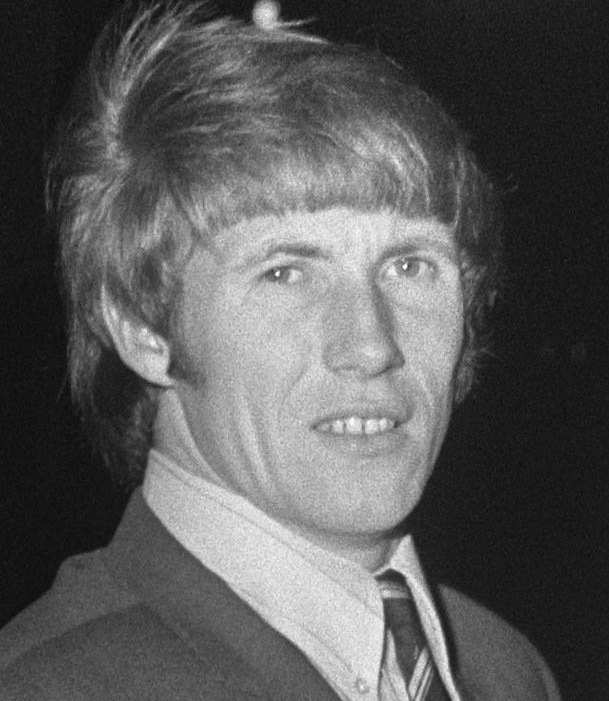
Colin Bell b. 1946,
City of Lost Souls
All that has changed now, of course. ‘When City are great again…’ wrote Mancunian music critic and lifelong City fan Paul Morley, in a short article titled ‘City of Lost Souls’ (Arena, November 1998), and lo it has come to pass. In August 2008, City were purchased by the Abu Dhabi United Group, and massive investment ensued – not only in transfer spend on players, but on infrastructure, the youth academy, and the regeneration of east Manchester with facilities for the local community. Gradually, results began to match the upturn in player and managerial quality. 2011 saw City secure their first trophy in thirty-five years, with a 1-0 win over Stoke City in the FA Cup final. 2012 brought our first League (by then Premiership) title in forty-four years, with the famous two goals in injury time against relegation threatened Queens Park Rangers to turn a 1-2 deficit into a 3-2 victory in the last minute, thus beating United into second place on goal difference (having already thrown down a marker by thrashing them 6-1 at Old Trafford earlier in the season). Every City fan remembers where they were at 93:20 on that sunny Sunday afternoon in May, otherwise known as the ‘Agüeroooo!’ moment. Me, I kept watching replays of Sergio’s winning goal for a week afterwards, in an effort to make sure that I hadn’t developed mild psychosis and entered an alternative reality. It confirmed for me that football provided the last vestiges of Greek drama in contemporary society, except that this was aleatoric theatre – a pop-up, if you will – for if you wrote it as fiction no one would suspend disbelief at this patently manufactured deus ex machina finale. Just when we thought it was going to be another case of ‘Typical City’, we emerged into a bright new sky blue dawn. The second Golden Era, it seemed, was well underway.
City won the Premiership again in 2013–14 under Manuel Pellegrini, who had replaced Roberto Mancini, the man who had presided over the beginnings of our historic resurgence. The arrival of tactician extraordinaire Pep Guardiola as coach in 2016 signalled the start of a period of sustained success for the club. City have won five out of a possible six Premiership titles between the 2017–18 and 2022–23 seasons, only finishing second behind Liverpool in 2019–20. 2018–19 saw City complete an unprecedented domestic treble of English men’s titles – the Premiership, F.A. Cup and League Cup. Add in a rake of League Cups over the same period, and the rosy picture is almost complete. But 2022–23 turned out to be the greatest season in our club’s history, as we not only won our third consecutive Premier League title, but also the F.A. Cup final against old foes Manchester United, and the long-awaited supposed Holy Grail, our first European Champions League Cup, in a final versus Inter Milan (incidentally, my favourite Italian team – almost a win-win situation, if there is such a thing), thereby achieving a rare feat – the continental treble.
Which just goes to show: if you wait long enough, everything comes around.
Envy and Ire
Unsurprisingly, the influx of such vast resources, and the on-field dominance it has brought, has aroused the envy and ire of supporters of other clubs. (I hesitate to use the term ‘rivals’, as it suggests that there are teams capable of challenging us on a consistent basis; in this case, can we settle on ‘competitors’ as the designation least offensive to all parties?) This discontent at City’s serial successes is exacerbated by a sense of injustice, as accusations of City’s breaching of both UEFA’s and the English Football Association’s Financial Fair Play rules fuel feelings that the club has bought its way to the top, due to the deep pockets of its owners and their skulduggery in the dark arts of creative accounting. Furthermore, there is the implication that because said proprietors are one of the ruling families of the United Arab Emirates, and the U.A.E.’s human rights record is less than pristine, then City’s wealth is tainted and its fans are hypocrites. Friends and acquaintances have asked me, often goadingly: how I can profess to be any kind of socialist and yet continue to support a team which represents the triumph of monied elitism? What kind of cognitive dissonance is involved in advocating for Boycott, Divestment and Sanctions against apartheid Israel, when migrant workers are routinely treated appallingly in Abu Dhabi, and reports circulate of government critics of the U.A.E.’s repressive regime being imprisoned and tortured? Am I ultra-selective in the causes I choose to espouse? One of the things this essay is, is an attempt to address, and hopefully explain – if not quite reconcile – some of these apparent contradictions.
This air of grievance is felt especially acutely in Ireland. There is a sketch by comedy trio Foil, Arms and Hog, where an applicant for Irish citizenship is asked a catalogue of questions as a test of knowledge for eligibility. One of the queries goes: ‘What are the two main religions in Ireland?’ Our candidate doesn’t miss a beat, responding with the quip, ‘Manchester United and Liverpool’.
While there are devout members of other denominations – for example, Chelsea, Arsenal, Spurs, Leeds, Everton, Aston Villa and West Ham all enjoy healthy fanbases on these shores, and I have even met the odd adherent of exquisitely eccentric sects like Ipswich Town and Stoke City – the overwhelming majority of Irish soccer fandom of English clubs is comprised of faithful followers of either United or Liverpool. To be sure, there are often sound reasons for such gargantuan support, such as family tradition or connections with one or other of the clubs, or the presence of many Irish players or players of Irish extraction in current or previous squads. Yet, just as often, Irish people attach themselves to an English club for motives which are almost entirely arbitrary – the colour of a jersey or the first game they ever saw or a favourite player. (This is true of sporting loyalties, including football, everywhere. Although a Mancunian born and bred, qualified lawyer and professional investigative sports journalist David Conn, while hailing from a predominantly United family, became a City fan almost by accident, rather than orneriness: when he was six years old, and asked to choose between the two local clubs, he looked at their respective badges – United’s a red devil with horns, City’s a rose beneath a ship – and opted for light blue. Incidentally, Conn’s Richer Than God: Manchester City, Modern Football and Growing Up (2012) remains one of the best books about football ever written – and not just for City fans – combining as it does a forensic trawl through City’s financial dealings with the changing attitudes and mixed emotions of a lifelong fan witnessing the monetisation of the modern game. In many ways, my own effort here is just a pale imitation of Conn’s achievement, albeit from an Irish fan’s perspective.)
But the most common explanation for the popularity of Liverpool and Manchester United in Ireland is, I submit, because both clubs were, in the past, serial winners, just as City have become today. Many of these could be termed ‘legacy fans’ (the same is true of Arsenal, Chelsea and Leeds) – relics of when their clubs were much more successful, which was when they started supporting them. It’s easy to back a winner, and there is safety – and solidarity – in numbers. The herd instinct kicks in. This is why one notices a more than average quota of fair-weather fans among their number. When their team of choice hit a bad run of form, or their trophy haul is depleted, you will hear all kinds of excuses for slackening of interest, and the declaration ‘The game is gone for me’ because of the deleterious influence of floods of cash, or the introduction of VAR, or the corruption of governing bodies, or whatever.
Yet, if I had a penny for every ardent United or Liverpool fan I’ve ever met, and inquired of ‘Have you ever been to Old Trafford / Anfield?’, and drawn a blank – well, I would have a lot more pennies than I do today. For, as Paul Morley put it in his piece mentioned above: ‘To support United is too easy. It’s convenience supporting. It makes life too easy. There is no challenge. It is a cowardly form of escapism, a sell-out to the forces of evil…to support them is heroism in a can.’ Since the wheel of fortune has spun kindly in the direction of what legendary former United manager Sir Alex Fergusson once called their ‘noisy neighbours’, doubtless many United fans now feel exactly the same way about City. In United’s glory days, there used to be a loose coalition of fans of many other clubs congealed around the banner of ‘ABU’: Anyone But United. Nowadays, it has been supplanted by the amended acronym, ‘ABC’: Anyone But City. Fans of every club are inclined to partisan paranoia when they feel things are not going their way. But here’s the twist: there are far more Liverpool and Manchester United fans in Ireland than City fans. Is it any wonder that we City fans sometimes feel like a persecuted minority? And all for the crime of playing exciting, entertaining football – at a level rarely, if ever, seen before.
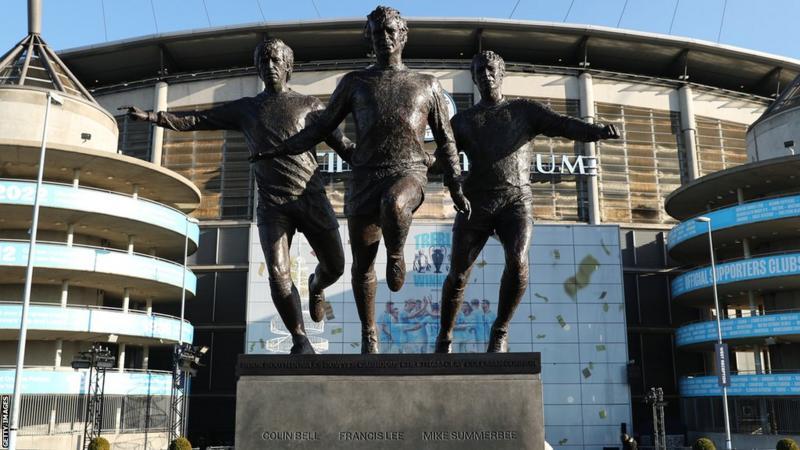
Etihad Stadium, Manchester.
Anti-City Bias
This anti-City bias is not confined to the foot soldiers of the red hordes (as I tend to think of the innumerable fans of these two clubs found in evidence hereabouts – rather than envisioning groups of radical revolutionaries huddled under beds around the country), but is also noticeably visible and voluble among the many high priests of their persuasion present in the Irish soccer media – hardly surprising when one realises that the majority of sports reporters and analysts here are drawn from the ranks of one or the other red menace. Clearly, fans of other clubs, and their public representatives, frequently hate on us too. But the gross preponderance of Reds’ affiliates in the make-up of the national football commentariat is not difficult to account for: if Ireland as a nation has large contingents of Liverpool and United fans, then print and broadcast media – dependent as they are on advertising revenue – will broadly pander to and reflect the views of that massive target audience which, in a classic case of vicious circle marketing, comprises a large section of its readership and viewership.
It is difficult to delineate this prejudice without mentioning some names. Certainly, the old guard were dead against us, with Eamon Dunphy publicly venting his dislike of ‘the City project’ when he was a freelance contributor on RTE television. Presenters such as Joanne Cantwell regularly goaded him on. But then, he used to play for Manchester United.
Of the current crop, Ken Early’s latent loyalties are easily identifiable from his Irish Times article headlined ‘Manchester City’s dominance a reminder the rich always get their way’ (20/01/22). Among many contentious statements contained therein, a pair of standouts were, ‘Most of us don’t watch football for technical quality or tactical intrigue. We’re watching because we want to feel something – and the risk of defeat adds savour to the joy of victory’, which he then linked to the ludicrous claim, ‘Look at the joy Manchester United have given the world these last several years. Lurching from crisis to crisis, they continue to be more watchable than City’s vastly superior team.’ The first is an appalling admission from a paid pundit, whose job it is to keep abreast of the strategic evolution of the game. Besides which, Manchester City still and always will be beatable – just like any other team – and watching them gives rise to a great variety of emotions in me, and other City fans. Plus, discerning neutrals can and do admire the precision of a well-executed game plan which City provide. As for the second, even diehard but cleareyed United fans know it is not true. They would acknowledge that United have for some time – since the retirement of Sir Alex – been a mismanaged laughing stock, which is why many of them have flocked to green-and-gold wearing protest club, Newton Heath. While there may be considerable schadenfreude to be derived by fans of other clubs in watching United’s steady decline into a comedic soap opera, they are surely no longer heading to Old Trafford to witness object lessons in how the Beautiful Game should be played. At the time of Early’s salvo, I wrote a fulsome rebuttal to the Letters page of the IT which was not, as was only to be expected, selected for publication. I subsequently penned a one sentence rejoinder, quoting his ‘more watchable’ assertion, which did see the light of day. It simply read: ‘Would it be impertinent to inquire as to what (red) planet he is living on?’
Meanwhile, the Sunday Independent is a virtual Liverpool FC fanzine, platforming as it does the Scouse-loving triumvirate of Dion Fanning, Eamonn Sweeney, and Declan Lynch.
Of the three, Fanning is the most measured and fact-based (evidently qualities not much valued at the Sindo, as his work is now more often to be found in the pages of the Irish Examiner, and he has been involved with podcasts for Joe.ie and The Currency.ie) in his criticisms. But his allegiances are easily discerned from a piece like the one headlined ‘A different Liverpool story in a parallel universe’, with standfirst ‘Liverpool’s golden age is ending but is it any consolation if one day they discover they were cheated?’ (The Irish Examiner, April Fool’s Day, 2023). Ineluctably, he highlights that City have been ‘charged by the Premier League with 115 breaches of financial regulations’, and refers to claims that City have ‘used shadow contracts to pay players’. However, he fails to address the argument that such ‘artificial rules’ are designed to protect the existing elite, other than to counter that ‘most rules in sport are absurd and all clubs in the Premier League agreed to these ones.’ Nor does he mention that City had since won their appeal against UEFA at the Court of Arbitration for Sport, for the alleged use of such shadow contracts, and for the alleged hiding of owner investment as sponsorship money – even if the Premier League charges have still to be answered. In fairness, Fanning could not have known at that point that Rui Pinto, the hacker who made public his ‘Football Leaks’ revelations, which were subsequently covered by German news magazine Der Spiegel, and led to the initial UEFA two-year ban on European competition for City, would be sentenced to a four-year suspended prison term for his crimes, including extortion, in September 2023.
Sweeney is a different case entirely, as he is the source of the most vicious and sustained attacks on Manchester City in this Mediahaus organ. A brief selection of sample headlines from recent years will suffice to illustrate his naked animosity: ‘Looks like Guardiola’s best days are in the past’ (10/11/2019) (that one wore well); ‘Man City’s manager is the figurehead for an organisation which represents all that stinks about modern sport’, the intro of which reads ‘Manchester City are football’s most despicable club and Pep Guardiola its most despicable manager’ (18/07/2020); ‘Soulless City will win title, but Liverpool have hearts and minds of fans’ (19/12/2021); ‘A classless man in charge of a classless club run by classless people’ (22/05/2022); ‘Ugly truth behind the success of City’ (29/04/2023). Without parsing each article word for word, take my word for it that, in any other context – and undoubtedly if it were directed against his preferred Liverpool or many others’ preferred Manchester United – his bile would be widely regarded as libellous incitement to hatred.
As for Hot Press alumnus Lynch, one is never quite sure as to what extent his tongue is firmly in his cheek or how much he actually means it (probably some weird admixture of the two), due to his unremitting deployment of ironic overstatement. In ‘Big Money meets Big Football meets Big Law’ (26/05/2019), having bemoaned the evils of leveraged buy-outs of clubs by ‘rich-guys-with-no-money’, he continues: ‘Now we’ve got rich-guys-with-money, indeed the problem with the rich guys who own City is not just that they are considerably richer than the rich guys who own Liverpool or Spurs, they are limitlessly rich as only oil-rich countries can be, they are ludicrously, crushingly rich. And still… still they’re in trouble with UEFA, accused of breaking rules in relation to Financial Fair Play.’ As though rich-guys-with-no-money are somehow preferrable to rich-guys-with-money. He endeavours to bolster his case by arguing, ‘One is reminded of the fact that football of the American kind is considered so important, it is rigged like some socialist experiment’, when it could just as easily be framed as being so important that it is rigged like a capitalist experiment – like the rest of U.S. society. By-the-by, he concludes that week’s column with analysis which lays the blame for Brexit firmly at Jeremy Corbyn’s door, a good indication of where his ideological sympathies lie. This is what passes for informed, astute political commentary in the reputed highest-circulation Irish Sunday newspaper. In ‘Don’t mention the war: filthy rich Manchester City were once hilarious losers just like Basil Fawlty’ (11/02/2023) he states: ‘There are complexities within this story of the Premier League charging Manchester City with breaking 115 financial fair play rules…But there are great simplicities to the case too, the most obvious of which is this: I don’t know any fans of Manchester City. I know fans of Man United, Liverpool, Arsenal, Chelsea, Spurs, Aston Villa, Everton, Leeds United and West Ham. I even know a Nottingham Forest fan. But I don’t know any fans of Manchester City.’ Maybe Lynch should get out more. He is welcome to attend one of the triweekly meetings of the City Supporters Club – Dublin Branch (of which more anon) to check out how many City fans there really are hiding in plain sight in his midst. But it is in the terseness of his tweets that Lynch gives himself revealing free reign: ‘City are not a good side’ is a gnomically reiterated mantra of his; while ‘Would love to see the Arsenal winning the league obvs, yet I fear City* have aimed for a narrow win this season to maintain the illusion that the competitive structure hasn’t been wrecked by their incessant, hydra-headed cheating’ (8/05/2023); ‘Interesting to see comments about the Arsenal ‘bottling’ it from football writers who “bottle” the mention of those 115 charges against Man City* every day of the week’ (18/04/2023); and ‘No, the biggest bottle in history is the abject failure of so many English journalists and broadcasters to even mention that City* are facing 115 charges of cheating’ (15/05/2023) enter the realms of conspiracy theory nonsense. (It took a while for me to figure out why Lynch habitually places an asterisk after every obsessive mention of City, but eventually Merriam-Webster furnished what I presume is the answer: ‘the character * thought of as being appended to something (such as an athletic accomplishment included in a record book) typically in order to indicate that there is a limiting fact or consideration which makes that thing less important or impressive than it would otherwise be.’
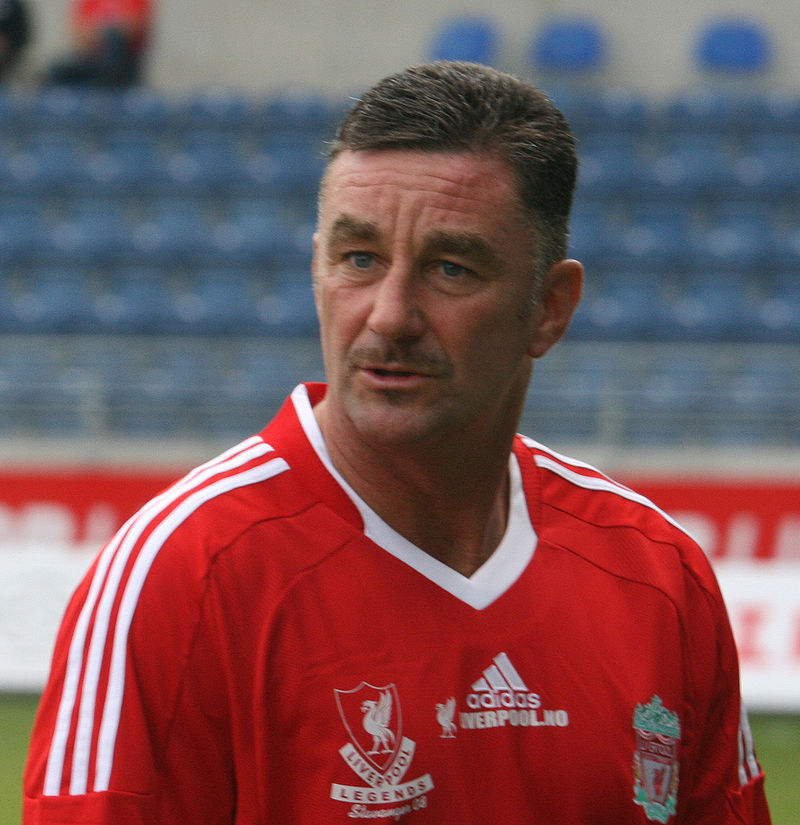
John Aldridge
John Aldridge
The Sunday World features a ghost-written column by ex-Liverpool and Republic of Ireland stalwart John Aldridge. Week in week out, in plain man’s language, he trumpets Liverpool’s cause: the reason they are not able to compete is City’s perfidy. He is quoted in an interview with Kevin Palmer headlined, ‘It’s time to hammer Man City if they are found guilty’ (9/02/2023): ‘Everyone knows this has gone on from day one. They have done well to get away with it for so long. We will have to see what comes out in the wash and give themselves a chance to prove their innocence.’ Was no subeditor at the SW alive to the patent contradiction covered in the space of those three short sentences? In his own ventriloquised voice, in ‘Surprise guys can claim a Champions League spot’, he tells his red readership, ‘As I’ve mentioned in my Sunday World column, Manchester City’s dominance at the top of the Premier League table is a big problem for the English game, as interest will wane if they win the title by a mile every year’ (24/9/2023). Even if City have succeeded by nefarious means, is that even true? The Bundesliga attracts more than fans of serial winners Bayern Munich (eleven consecutive titles, and counting).
But perhaps the most egregious example of anti-City vilification comes courtesy of Miguel Delaney, who works for the London Independent but is of part-Irish extraction, and a known Liverpool aficionado. (He claims to support one Irish club and one Spanish club, but no Premiership club) Delaney tends to adopt the moral high ground, focusing more on the U.A.E.’s campaign of ‘sportswashing’ – an attempt to render their human rights abuses more palatable to the world – rather than on the resources the owners’ wealth places at City’s disposal. I will tackle these problems in due course, but for now, here is a smattering of Delaney’s critique. In his consideration of City’s 2023 title win, headlined, ‘Five titles in six years: Are Manchester City destroying the Premier League?’ over a standfirst of ‘Pep Guardiola has been given limitless funds to create the perfect team in laboratory conditions, and the result has been an almost total eradication of competition at the top of the Premier League’ (22/05/2023), he declares, ‘City have brutalised the very idea of sporting competition. There’s been no tension. There’s been no drama’, going on to assert, ludicrously, ‘That has meant there haven’t been any real memorable moments, beyond some great goals and the repeated image of Haaland and De Bruyne tearing at goal.’ Those images were, precisely, memorable moments. He concludes with, ‘The reality is all of City’s success is ultimately explained by the fact they are a state project.’ Prior to that, writing in his newsletter (17/05/2023) in the wake of City’s 4-0 win over European giants Real Madrid in the Champions League semi-final, second-leg at The Ethiad (a game I was lucky enough to attend), Delaney revealed that ‘sources within the game (and with Delaney, it is always unnamed ‘sources within the game’) are growing concerned with how City are brushing all before them aside.’ It is little wonder that Declan Lynch has commended Delaney on X (formerly Twitter), praising him for ‘doing God’s own work’. However, while other top clubs may be aggravated by City’s dominance, it is fair to say that City fans are rejoicing in it.
It might be a good idea if all those engaged in public discourse around football in Ireland were required to declare their interests before being allowed to comment. On second thoughts, perhaps there is no need for this measure as, as has been demonstrated, many of them already do this freely, yet their outpourings are not met with the requisite scepticism – because they are preaching to the converted, and their favouritism is plain for all to see.

